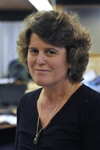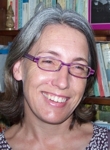| site search by freefind |
The Write Stuff
...two locals receive encouragement and support from Varuna publishing fellowships
By JANENE CAREY
[This article was published in The Armidale Express My Life magazine, February 2010. Photo of Helena Pastor by David Elkins.]
WRITERS may toil for years without being sure if anyone will be at all interested in their final product; however, two local women can sit down at their keyboards in 2010 confident that a publisher finds their ideas intriguing and has promised to read their manuscripts when they are finished.
Helena Pastor and Susan McMichael (see below) have both won Varuna Publishing Fellowships, an initiative that allows publishers to express interest in a project well before it is normally possible.
From an initial field of 500 applications nationally, the selection committee presented eight publishers with shortlists of ten, and each publisher chose three winners. Six of the final 24 came from regional NSW; two of those from Armidale.

|
HELENA PASTOR Telling the story of the Iron Man Welders. (Click on image to enlarge) |
Helena Pastor's fellowship is with Griffith Review, a quarterly journal of essays, reportage, memoir and fiction designed to look at significant public issues from a variety of perspectives. Helena is writing about the life and energy behind the Iron Man Welders, an Armidale youth work program organised by Bernie Shakeshaft.
In a speech to state parliament in 2008, Richard Torbay MP made the following remarks about the background and success of this innovative program:
"One of the most intractable problems facing our society today is the number of young people at risk who are still slipping through the cracks, despite the best efforts of educators, youth workers, government agencies and community groups. Engaging them in positive behaviour and reconnecting them with the education they have missed so that they can get jobs is still a major challenge... "
"I first became involved with the Armidale Iron Man Welders project when I was introduced to its coordinator, Bernie Shakeshaft, by the New England Credit Union chief executive, Kevin Dupe. Bernie had sought help from NECU to back a project to teach a group of 16 at-risk young men to learn to weld..."
"Of the original group that entered the program in December 2006, six are now in apprenticeships, four in full-time employment and an additional six have completed certificate II courses in engineering at TAFE."
In writing her piece for Griffith Review, Helena will use material she has been collecting since 2007, when she began a PhD at the University of New England focussing on the Iron Man Welders. Her PhD is a non-traditional type: instead of a monolithic academic thesis she will be submitting a book-length creative non-fiction book manuscript plus a small dissertation.
Helena's story revolves around the charismatic figure of Bernie Shakeshaft and his interactions with the boys: his no-nonsense leadership style and his iron-clad expectation that they should 'own' what they are doing and not cede responsibility for decisions to him.
Her research saw her spending most Sundays at the welding workshop on Waterfall Way over a period of 18 months, bringing a tray of home-made chocolate brownies each time as a gesture of goodwill. At first she stood against the wall of the shed, observing and making notes about what was going on; then she decided the best way to get to know everybody was to pick up the power tools and join in the work.
Helena very much appreciates how welcome she was made to feel in this particularly masculine environment.
"I'm grateful to Bernie and the boys for giving me access to their world at the shed," she says."I learnt so much from my time with them."

|
SUSAN McMICHAEL Evoking the fraught arena of the school playground. (Click on image to enlarge) |
Susan McMichael's fellowship is with Text Publishing, and falls under a category aiming to capture distinctive and unusual voices that may not easily find a place in the world of commercial publishing. Susan's theme is the school playground - that fraught arena where friendships and alliances are forged, where games are played of both the physical and the psychological kind, and where it is painfully obvious who is acceptable and popular and who is not.
"It's about friendship and what makes good friends," says Susan. "And alliances and bullying and being ostracised. The games you play, and how you get to join in."
She notes that when she tells people that she is writing about the school playground, reactions are polarised.
"People either remember it with rose-coloured glasses and say it was fantastic; or they say: 'I never want to see it again.'"
'The Girls in my Head' is a novel which began life as a collection of very short stories, each one around 200-500 words long. When Susan began writing them, there wasn't even a name for pieces of this length; later they began appearing in magazines labelled as prose poems or micro stories.
|
Recess Tabitha and Alice are playing hopscotch. They throw small round stones, jump and scream. Their hair swings out and Wendy runs over - she loves hopscotch! The words are in her head. Neatly written, spelled right, heard. She can see each of the words - they are spilling out of her mouth and onto the shiny black playground. Everyone is looking at her. The words hurt - they are grey and smell funny- like the eggs that she has at lunch. The peel is smooth brown in her mouth, crumples, and the white spills the yolk breaks, smells and everyone round her moves, wrinkle their noses. The words dry in her mouth. "Let me play." she wants to say. But it comes out "lerve me plig" It rushes out like cordial spilling all over the table, meandering all over the playground, words orange and sticky, stained so that everyone can see. "We don't want to plig with you!" says Tabitha and Justin makes snorting noises at her all afternoon. She doesn't want to play anymore. |
The fellowships won by Helena and Susan are not a guarantee of publication, but they do offer solid encouragement and the opportunity to spend an interruption-free week at the Varuna Writers' House in the Blue Mountains near Sydney. Varuna is the large Katoomba home bequeathed to the NSW government as a writers' retreat by the family of Australian author Eleanor Dark. Five writers are in residence at any one time, and are provided with individual bedrooms, writing spaces and all meals.
Both Helena and Susan have stayed at Varuna before, and are thrilled by the prospect of returning to an environment where all the normal demands of everyday life are suspended and they can focus completely on their writing.
"It's heaven," says Helena. "Especially for mothers like me. My fellow housemates and I write hard during the day, then spend the evenings eating gourmet food, drinking wine, and playing ferocious games of Scrabble."
Susan plans to take her week at Varuna in May; Helena will take hers in August. A panel from Varuna, including director Peter Bishop, will help them decide when their manuscripts are ready to be dispatched to their prospective publishers.
The New England Writers' Centre is assisted by the NSW Government through Arts NSW.